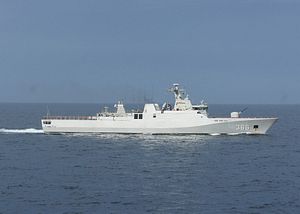Since the appointment of Indonesia’s new marine affairs and fisheries minister Susi Pudjiastuti, the country’s decision to employ a ‘sink the vessels’ policy against illegal fishing has emerged as a significant and controversial issue.
The policy itself is not new. As the director general of marine resources supervision at the Maritime Affairs and Fisheries Ministry Asep Burhanudin has previously noted, 33 illegal foreign were sunk between 2007 and 2012, with 32 of them being from Vietnam.
There have also been differing estimates floated in terms of the annual losses Indonesia suffers due to illegal fishing in its waters. President Joko “Jokowi” Widodo has mentioned on numerous occasions that the losses are around 300 trillion rupiah ($25 billion), while Susi has stated that it is around 240 trillion rupiah. Putting aside the debate on the losses Indonesia incurs annually as a result of illegal fishing, the important question that should be addressed is whether its ‘sink the vessels’ policy is legal or not, a question that some others have also attempted to answer previously. To do so, let us examine both Indonesian domestic law and international law.
Let us first have a look at Indonesian law. According to Article 69, Paragraph 4 of Law No. 45/2009 on Fisheries, Indonesian authorities are allowed to burn or sink foreign fishing vessels conducting illegal fishing within the Indonesian fishing management area subject to the sufficient preliminary evidence. That law amended Law No. 31/2004 on Fisheries which stipulated that the Indonesian fishing management area consists of Indonesian waters (internal waters and territorial sea) as well as the exclusive economic zone (EEZ) of Indonesia. Therefore, it is quite clear that the actions taken by Indonesian authorities in blowing up or sinking foreign fishing vessels is in accordance with Indonesian domestic law.
Now let us turn to international law. The main international legal reference point is the United Nations Convention on Law of the Sea (UNCLOS). While UNCLOS does not specify whether sinking vessels is legal or not, it does mention measures that may be taken to enforce laws and regulations against acts like illegal fishing depending upon the zone in which the acts are conducted – the territorial sea, the EEZ, or the high seas. There are only two zones in which the ‘sink the vessels’ policy would be relevant – the territorial sea and the EEZ – since these are the zones in which Indonesia has some sovereign rights.
With respect to the territorial sea, there is no specific provision that regulates steps that can or cannot be taken against vessels used for illegal fishing. The closest provision is found in Article 21 point 1(e) which states that “the coastal State may adopt laws and regulations, in conformity with the provisions of this Convention and other rules of international law, relating to innocent passage through the territorial sea, in respect of…the prevention of infringement of the fisheries laws and regulations of the coastal State.”
With respect to the EEZ, Article 73 of UNCLOS regulates the enforcement of laws and regulations in that zone. That article clearly specifies that the coastal State may take measures “including boarding, inspection, arrest and judicial proceedings” (point 1), but that “penalties for violations…may not include imprisonment…or any other form of corporal punishment (point 3).” Therefore, international law does not seem to support Indonesia’s ‘sink the vessels policy’ if it is conducted within Indonesia’s EEZ.
Another interesting question is to consider whether or not international law would also prohibit Indonesia’s ‘sink the vessels policy’ if it is conducted in other areas that are not Indonesia’s EEZ – such as internal waters, archipelagic waters, or the territorial sea of Indonesia. Since there is no provision within UNCLOS regarding how the ‘sink the vessels policy’ would apply in these areas, and since article 21 of UNCLOS is applicable to vessels breaching innocent passage, it would seem that it would depend on the coastal State’s interpretation of the application of international law on this matter.
Given that UNCLOS was conceptualized in order to maintain peace and justice – as stipulated in its preamble – it is advisable for Indonesia to conduct judicial proceedings before sinking vessels which are allegedly involved in illegal fishing. In this way, Indonesia would also be giving other states a chance to defend their rights. More efficient judicial proceedings should also be employed so as to cope with the high number of violations which occur each day. The ‘sink the vessels’ policy is a good way to create a deterrent effect. However, legal procedures at both the domestic and international level should be well respected and implemented accordingly as well.
Ahmad Almaududy Amri is a PhD candidate at the Australian National Centre for Ocean Resources and Security (ANCORS), University of Wollongong, Australia, where he is writing his thesis on maritime security challenges in Southeast Asia. He holds a Master of International Relations from the University of Indonesia, a Master of Laws from Gadjah Mada University, and a Bachelor of Laws from the University of North Sumatra.
































